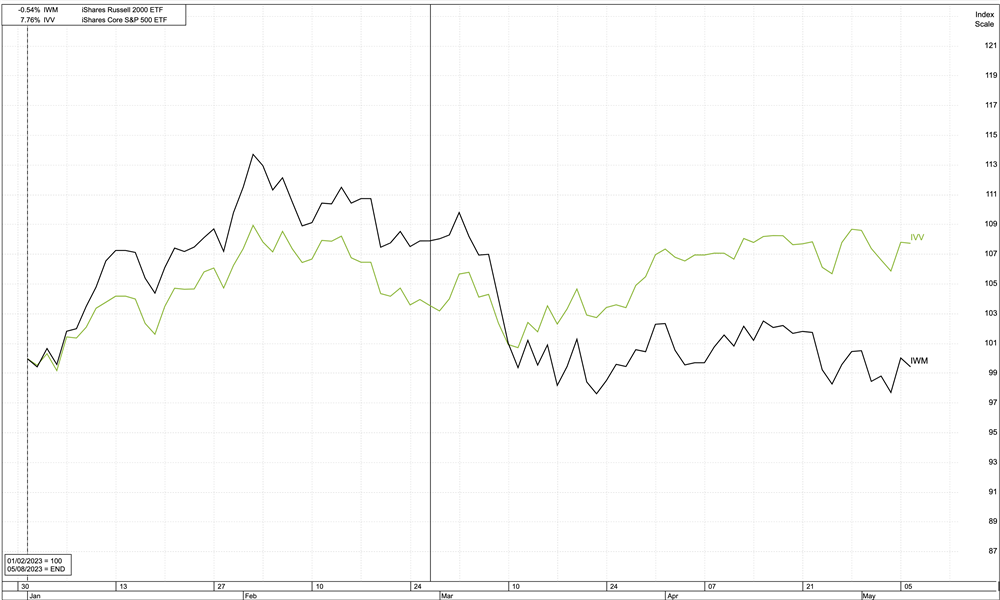
Small caps, as tracked by the iShares Russell 2000 ETF (NYSEARCA: IWM) outperformed the S&P 500 in the past week, but over the past four years, large caps have been the clear leaders. Although small-cap stocks don’t get as much attention as big companies, mostly due to less opportunity for institutional ownership, small-cap momentum can be a bellwether for broad market action.
To dig into that idea, let’s first debunk a myth that you may have heard recently: Regional banks are not, in fact, leading the small-cap index lower. Like larger indexes, such as the Russell 3000 or S&P 500, the Russell 2000 is also broken down according to sector.
As of April 30, the most heavily-weighted small-cap sectors are industrials and healthcare, with weightings of 17.50% and 16.81%, respectively. Financials come in third, with a 14.86% weighting, followed by consumer discretionary, at 13.90%. A quick glance at those allocations tells you immediately: Mathematically, regional banks couldn’t possibly lead small caps lower since they aren’t weighted heavily enough. Even the financials sector includes other types of companies, not just regional banks.
The top holdings within the Russell 2000 represent a number of sectors. They are:
- NASDAQ: SWAV">Shockwave Medical Inc. (NASDAQ: SWAV): Health Care
- Emcor Group Inc (NYSE: EME): Industrials
- Iridium Communications Inc. (NASDAQ: IRDM): Telecommunications
- Saia Inc. (NASDAQ: SAIA): Industrials
- Apellis Pharmaceuticals Inc. (NASDAQ: APLS): Health Care
- Inspire Medical Systems Inc,. (NYSE: INSP): Health Care
- Crocs Inc (NASDAQ: CROX): Consumer Discretionary
- Texas Roadhouse Inc. (NASDAQ: TXRH): Consumer Discretionary
- Kinsale Capital Group (NYSE: KNSL): Financials
So setting aside the idea that the recent small-cap underperformance is due to regional banks, we can now address the question of whether small caps might be a harbinger of broader market declines.
Small Caps Are Riskier
As a rule, small caps are riskier than their larger counterparts. They can also be more sensitive to various economic factors, including inflation or higher interest rates. For some of the larger, more established companies categorized as small caps, such as those listed above, there’s often greater access to credit, and economies of scale can help mitigate costs. But for newer companies with less access to capital, a tight credit market could put a damper on growth.
Over time, small caps can take the lead as markets recover from corrections, but they also tend to take the lead down as markets sell off.
According to research from asset manager New York Life, “Small-cap stocks tend to lead following a period of economic dislocation. With their more domestic business focus, they have also done well in times of a rising dollar.”
If you overlay the charts of the iShares Core S&P 500 ETF (NYSEARCA: IVV) and the IWM ETF, you can see the two are highly correlated in terms of momentum trends and direction. You can also spot some subtle differences in that the small-cap index frequently changes direction shortly before large caps.

Small Stocks Underperforming
We’re currently seeing small caps turning lower at a sharper rate than large caps; while the S&P 500 ETF trends essentially sideways, above its 50-day moving average, the small-cap index has traded below that line since March 10, and is showing no signs of reversing higher, despite outperformance in the past week.
So what does this mean for investors? There are no signs of the small-cap index melting down; for almost a year, the IVV ETF has tested lows above $162 and rebounded. it’s twice found support near $168 since late March. That indicates that a broad selloff isn’t likely, but neither is a barn-burning rally.
While the technicals aren’t signaling a crash in either large or small caps, they do seem to indicate the “meh” factor of ongoing weakness, perhaps taking the form of an extended period of sideways trade.
Will there continue to be opportunities in individual stocks, both large and small? Of course. In many cases, small caps can offer a better return, for investors who can stomach the additional volatility. Small caps are worth tracking in any market cycle, as they can offer an indication of what may be around the corner for their larger peers.







